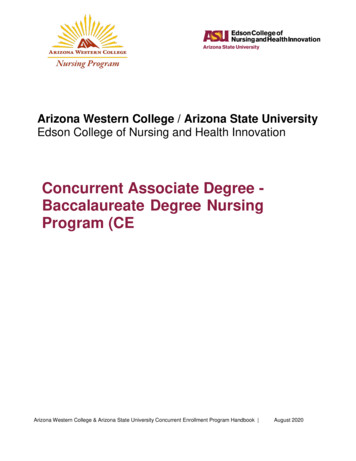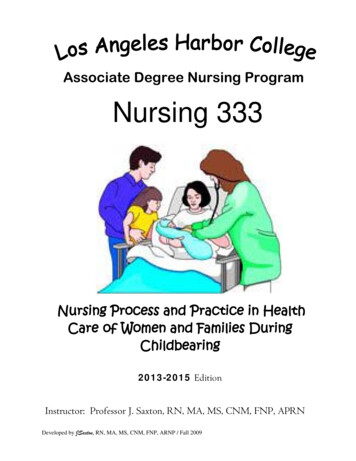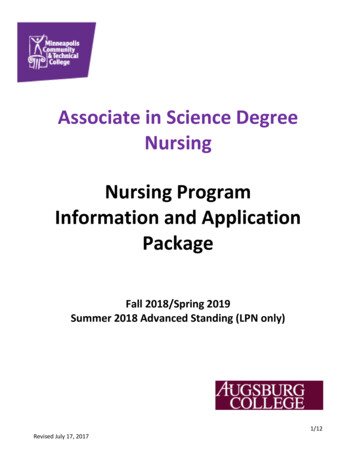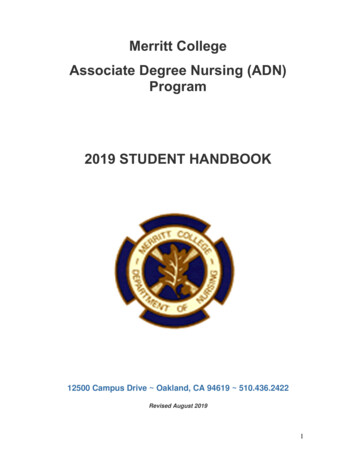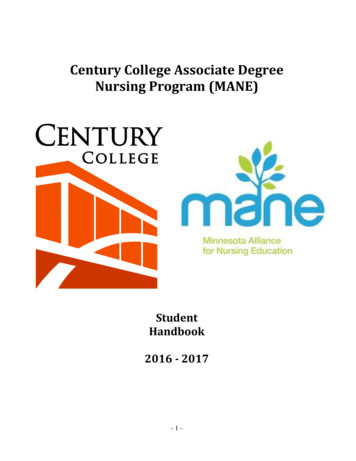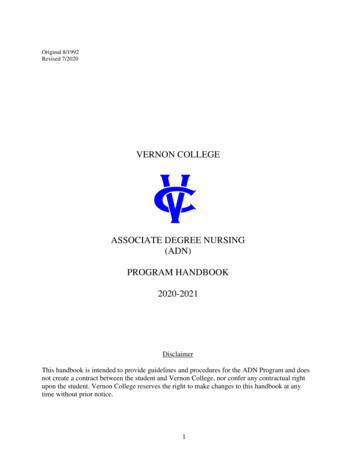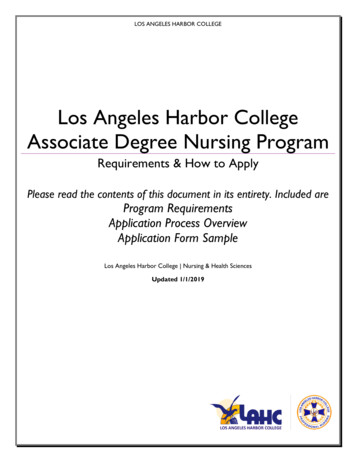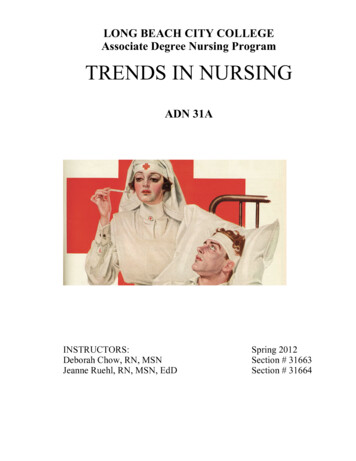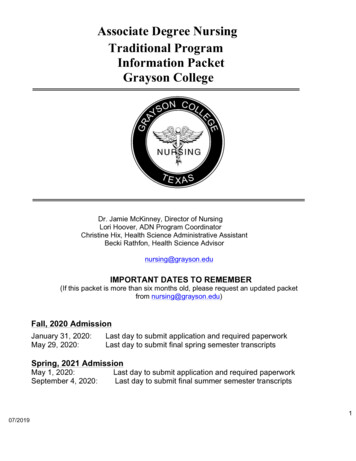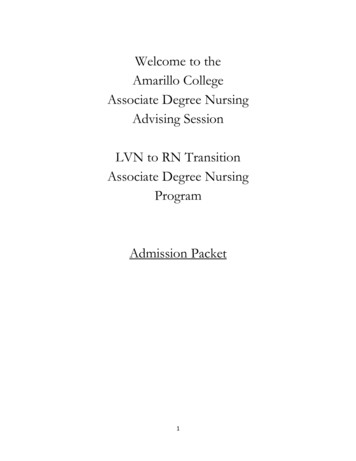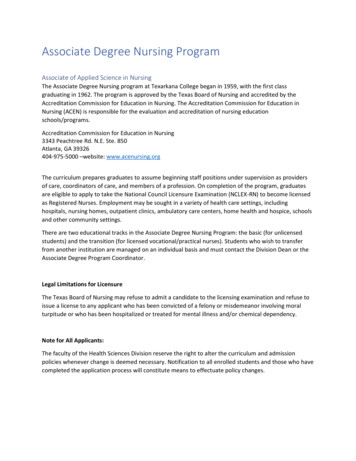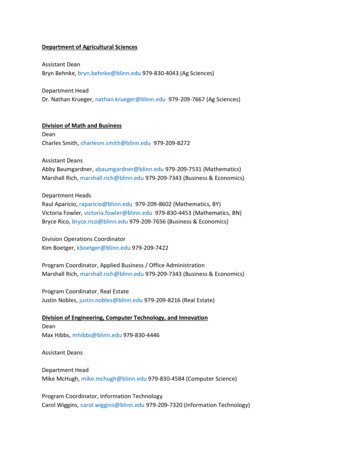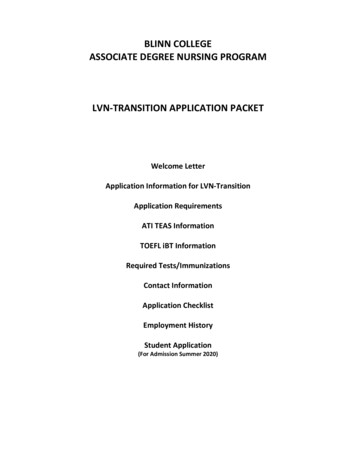
Transcription
BLINN COLLEGEASSOCIATE DEGREE NURSING PROGRAMLVN-TRANSITION APPLICATION PACKETWelcome LetterApplication Information for LVN-TransitionApplication RequirementsATI TEAS InformationTOEFL iBT InformationRequired Tests/ImmunizationsContact InformationApplication ChecklistEmployment HistoryStudent Application(For Admission Summer 2020)
A Letter from our Program DirectorDear Licensed Vocational Nurse – Transition Option Candidate:Thank you for inquiring about the LVN – Transition Option Program. Enclosed you will findprogram information, including the admission requirements and an admission application forthe LVN-T Program.The LVN-T Program starts a new class once a year beginning in the Summer I semester (whichusually begins about the first week in June). The LVN-T program is designed to be completed inone year.If you wish to be considered for admission into the program, you must submit evidence ofmeeting all of the application/admission requirements. The applicant is responsible to ensureall application information has been received at the Blinn College ADN Program office, and thattheir admission file is complete.If you have questions, once you have reviewed the application packet, please call 979-691-2012or email the program administrative assistant, http://www.blinn.edu/twe/adn/faculty.html.Best wishes in the pursuit of a rewarding career in nursing through our Associate DegreeNursing Program at Blinn College.Sincerely,Karla Ross, DNP, RN, CNEAssociate Degree Nursing ProgramRELLIS Campus Blinn College Faculty Annex 1455 4th StreetBryan, Texas 77807 (979) 691-2012 Fax (979) 475-1320
APPLICATION INFORMATION FOR THE LVN-TRANSITION OPTIONThis application is a special option available for LVNs who meet specific admission criteria tocomplete the ADN Program requirements in one calendar year.Students admitted to the LVN Transition Option take five nursing courses (Transition - Theoryand Clinical, Mental Health – Theory and Clinical, and Nursing Skills II) during the summer thenjoin 2nd year generic nursing students in the Fall Semester.The program allows the applicant to have classes in progress when applying. All programprerequisites must be complete by the end of the semester in which you submit your nursingapplication. Decisions regarding acceptance are made at the end of the semester in which youapply. Applicants are notified of acceptance shortly after final grades are received or posted.All applicants are required to provide proof of current Texas LVN/LPN licensure and work statuswhen they submit their nursing application. If accepted into the program, then applicant mustcomplete a drug screen, a health/physical exam, and provide proof of all requiredtests/immunizations required, at their own expense.
APPLICATION REQUIREMENTS FOR LVN-TRANSITION OPTIONAll of the following requirements must be fulfilled and evidence of their completion must be submitted.Failure to submit evidence of ALL application requirements will exclude the applicant from considerationfor admission.Applicant must have a current Texas LVN/LPN license and must have approximately one year ofnursing experience.Complete all Blinn College admission requirements and be admitted to Blinn College (NOTE:previous Blinn students who have not been enrolled in Blinn College for the previous Spring orFall Semester must reapply to the college through ApplyTexas). All applicants must be TSIcompliant.All prerequisites (including RNSG 1301 Pharmacology and RNSG 1215 Health Assessment) mustbe completed prior to admission. The Humanities/Fine Arts Elective is a co-requisite and may betaken after student receives admission to the program.Submit a completed Associate Degree Nursing Application (LVN-Transition Option) to the ADNoffice. (NOTE: Admission to the ADN program is a separate process from admission to BlinnCollege and requires a separate application). Acceptance to Blinn College does not guaranteeacceptance into the Associate Degree Nursing Program (LVN-Transition Option).Submit ALL official college/university transcripts with your nursing application to the ADN office.(NOTE: this includes Blinn College official transcript). It is the applicant’s responsibility to makesure official transcripts are also on file in the Admissions and Records Office at Blinn College.Highlight all courses on official transcripts that were listed on the Application Degree Worksheet(Page 3 of the application). You may open your official transcript in order to highlight courses.All “prerequisites” and “co-requisites” must be completed with a “C” or above and the minimumoverall GPA for those prerequisites and co-requisites must be a 2.5. The three science courses(Anatomy & Physiology I, Anatomy & Physiology II, and Microbiology) must not be more thanfive years old when you submit your nursing application. (NOTE: Blinn College ADN Programaverages all final grades for courses in degree plan. If a course is taken more than once within 5years, grades for each attempt are averaged.)Take the ATI TEAS. Please see the ATI TEAS information page in this packet for further details.The ATI TEAS must be completed prior to submitting nursing application and the ATI TEAS scoresheet must be included in nursing application packet. Student is ineligible for admission if ATIAcademic Preparedness Level is “Basic” or “Developmental” on the ATI TEAS.Students whose first/native language is not English (ESL), are required to take the TOEFL iBT,regardless of US education, or years of residence. (See TOEFL information page in this packetfor further details).Students must meet all essential qualifications listed on the following page
Essential QualificationsBasic Competencies for Progression and Graduation (including Physical andEmotional Standards)Successfully completing Blinn's ADN Program means the graduate has beeneducated to competently practice nursing in all healthcare settings and to apply forRN licensure. The education of a future nurse requires assimilation of knowledge,acquisition of skills, and development of judgment through patient care experiencesin preparation for independent, semi-autonomous practice where makingappropriate decisions is required.The curriculum requires students to engage in diverse, complex, and specificexperiences essential to the acquisition and practice of essential nursing skills andfunctions. Unique combinations of cognitive, affective, psychomotor, physical, andsocial abilities are required to satisfactorily perform these functions. In addition tobeing essential to the successful completion of this program, these functions arenecessary to ensure the health and safety of patients, fellow students, faculty, andother healthcare workers.Physical and emotional health are also critical to the successful progression andcompletion of this Program. Physical health is defined as the ability to perform bothfine and gross motor skills, being able to perform normal weight-bearing activities,and be free of communicable diseases. Emotional health is defined as reactingappropriately to stressful situations, understanding one’s own ability to cope withstressful situations, and behaving appropriately within the current environment.The essential abilities necessary to acquire or demonstrate competence in adiscipline as complex as nursing and needed for successful progression by nursing,(in addition to the standards of behavior and conduct set forth by Blinn College),include but are not limited to the following:Motor SkillsStudents should have sufficient motor function so they are able to executemovements required to provide safe effective general care and treatment topatients in all health care settings. [For example: For the safety and protection of thepatients, the student must be able to perform basic life support, including CPR, andfunction in an emergency situation. The student must have the ability, withinreasonable limits, to safely assist a patient in moving, for example, from a chair to abed, or from a wheelchair to a commode.]
Mobility – possess physical abilities sufficient to move from room toroom, maneuver in small spaces and stand and walk for extensiveperiods of time. Weight-Bearing – possess ability to lift and manipulate and move 45-50pounds (22 Kg) sometimes daily.Sensory/ObservationStudents must be able to acquire the information presented through demonstrationsand experiences in the basic and nursing sciences. He or she must be able to observea patient accurately, at a distance and close at hand, and observe and appreciatenon- verbal communications when performing nursing assessments andinterventions or administering medications. The student must be capable ofperceiving the signs of disease and infection as manifested through physicalexamination. Hearing – possess auditory ability sufficient for observation and assessment.For example, hear monitor alarms, emergency signals, auscultatory sounds,and cries for help.Visual – possess visual ability sufficient for observation anassessment. For example, observe patient responses to interventions.Tactile – possess tactile ability sufficient for physical assessment. Forexample, perform palpation, functions of physical examination and/orrelated therapeutic intervention, and insertions of various catheters.CommunicationStudents must communicate effectively and sensitively with other students, faculty,staff, patients, family, and other professionals. He or she must express his or herideas and feelings clearly and demonstrate a willingness and ability to give andreceive feedback. A student must be able to: convey or exchange information at alevel allowing development of a health history; identify problems presented; explainalternative solutions; and give directions during treatment and post-treatment. Thestudent must be able to communicate effectively in oral and written forms. Thestudent must be able to process and communicate information on the patient'sstatus with accuracy in a timely manner to members of the health care team. Theappropriate communication may also rely on the student's ability to make a correctjudgment in seeking supervision and consultation in a timely manner.CognitiveStudents must be able to measure, calculate, reason, analyze, integrate, andsynthesize in the context of the nursing curriculum. The student must be able to
quickly read and comprehend extensive written material. He or she must also beable to evaluate and apply information and engage in critical thinking in theclassroom and clinical setting. Students must organize responsibilities and makeappropriate decisions. Critical Thinking/Clinical Reasoning – process critical thinking and clinicalreasoning ability sufficient for nursing clinical judgment. For example,must be able to identify cause-effect relationships in clinical situations.Behavioral/EmotionalStudents must possess the emotional health required for the full utilization of his orher intellectual abilities, the exercise of good judgment, the prompt completion ofall responsibilities attendant to the diagnosis and care of patients and families. Inaddition, he or she must be able to maintain mature, sensitive, and effectiverelationships with patients, students, faculty, staff and other professionals under allcircumstances (with different social, intellectual, and cultural backgrounds) includinghighly stressful situations. The student must have the emotional stability to functioneffectively under stress and to adapt to an environment that may change rapidlywithout warning and/or in unpredictable ways. The student must be able toexperience empathy for the situations and circumstances of others and effectivelycommunicate that empathy. The student must know that his or her values,attitudes, beliefs, emotions, and experiences affect his or her perceptions andrelationships with others. The student must be able and willing to examine andchange his or her behavior when it interferes with productive individual or teamrelationships. The student must possess skills and experience necessary for effectiveand harmonious relationships in diverse academic and working environments.Professional ConductStudents must possess the ability to reason morally and practice nursing in anethical manner. Students must be willing to learn and abide by professionalstandards of practice. Students must not engage in unprofessional conduct, andmust possess attributes that include compassion, empathy, altruism, integrity,honesty, responsibility, and tolerance. Students must be able to engage in patientcare delivery in all settings and be able to deliver care to all patient populationsincluding but not limited to children, adolescents, adults, developmentally disabledpersons, medically compromised patients, and vulnerable adults.Content Credit: University of Washington School of Nursing, Rowan CabarrusCommunity College, and Blinn’s Radiologic Technology Program
ATI TEASDescription of ATI TEAS:The ATI TEAS is a required test for students submitting application to the Blinn College Associate DegreeNursing Program. The ATI TEAS measures basic essential skills in the academic content area domains ofreading, mathematics, science and English language usage. These entry-level skills were deemedimportant for health science program applicants by a panel of subject matter experts. The structure ofthe ATI TEAS will remain the same as the TEAS V. The test will have a time limit of 209 minutes and isbroken down into the four sections described above.Preparing for the ATI TEAS:Students can prepare for the ATI TEAS with several resources including the Official ATI TEASstudy manual (sixth edition), now available for purchase. Online practice assessments and thestudy package are available at www.atitesting.com.The following items are available for purchase from Assessment Technologies Institute (ATI) atwww.atitesting.com ATI TEAS Study Manual (6th edition)ATI TEAS Online Practice AssessmentsATI TEAS TranscriptsADN Program Instructions for taking ATI TEAS: Applicant must take ATI TEAS prior to submitting your nursing application. Applicant mustinclude your ATI TEAS score sheet in your application packet. Applicant may take ATI TEAS twice during an application period, but must test at least 4 weeksapart. ATI TEAS testing must take place before nursing application due date. If applicant has taken the ATI TEAS during a previous application period or for a different nursingprogram and wants to use those score results, then applicant must make sure that test date iswithin one year of the application due date. If applicant resides out of town/state, the ATI TEAS may be taken at another educationalinstitution or testing facility. The Blinn College Testing Center will no longer offer walk in testing on Saturdays. In order toregister for a Saturday test students must prepay Monday – Friday in Enrollment Services inBryan only. Seating is limited! No forms of payment will be allowed on Saturday testing dates.Instructions for completing the ATI TEAS at the Blinn College campus in Bryan, Texas are foundon the Blinn College website at https://www.blinn.edu/testing/ati-teas.html.
TOEFL iBT InformationApplicants whose first/native language is not English are required to take the TOEFL iBT, regardless of USeducation, or years of residence, and provide scores to Blinn College by the nursing applicationdeadline. Suggest students take the TOEFL iBT at least eight weeks prior to the nursing application duedate. The Blinn College Associate Degree Nursing Program requires ESL applicants to attain aminimum score of 83 on the Internet based test (iBT), with a minimum of 20 in reading, 20 inwriting, 20 in speaking, and 20 in listening. TOEFL results will not be considered if they aremore than two years old when nursing application is submitted. Information about the TOEFLiBT may be obtained from the following website, www.toeflgoanywhere.org.Please Note: the TOEFL score required by the Blinn College Associate Degree Nursing Program ishigher than the minimum required by Blinn College.TOEFL iBT scores must be sent directly from the testing agency to Blinn College Admissions. TheDestination Institution (DI) code for the TOEFL at Blinn College is 6043. Also, applicant should includecopy of TOEFL iBT score sheet with nursing application.
Tests and Immunizations Required by Associate Degree Nursing ProgramThe following is a list of tests and immunizations required by students who are accepted into the Associate DegreeNursing Program (LVN-Transition Option). All ADN applicants must provide documented proof of each requirementbelow in order to receive full admission into the nursing program. These documents will be required once studenthas been notified they are accepted into the program. Tuberculosis skin test should be done within 30 days ofprogram start date. (NOTE: Hepatitis B testing and immunization can take several months and applicant needs toplan in advance to meet requirement).All documentation of the requirements below will be uploaded by each student to CertifiedBackground.CertifiedBackground is a company that serves as a repository for student medical records. Once a student pays a feeand sets up their student profile with CertifiedBackground they will be able to upload their medical records and thenview those records. The program director and administrative assistant will also be able to view the medical recordsfor each student to verify they have completed the requirements.
HEALTH SCIENCES REQUIRED VACCINESTB Test-Date of vaccine must be good within a year (Must be valid throughout your entire program)Accepted TB tests:o TB skin test (with a negative result) If positive, then complete Tspot or Quantiferon Goldo TSpot (with a negative result) If positive, get x-rayo Quantiferon Gold (with a negative result) If positive, get-xrayo X-ray (negative chest x-ray) Valid for three years Must upload the radiology report Must complete an annual TB questionnaireo If you have received the BCG vaccination, then you must follow x-ray protocol or get a Tspot(with a negative result).TDAP (Tetanus, Diphtheria, and Pertussis)-Date of vaccine must be within 10 years.Must have the combo vaccine that contains all 3 vaccines.May appear on immunization history as TDAP or DTAP.MMR (Measles, Mumps, Rubella)-Option A: 2 vaccines (that are at least 4 weeks apart)Option B: A positive titer/serologic test for measles, mumps and rubellao Must be a quantitative testo If your titer test is negative, you must get booster vaccines following the test.Hepatitis B Titer test--A positive titer/serologic test for Hepatitis Bo Must be a quantitative test.o If your titer test is negative, you must get booster vaccines/repeat series following the test.*If you never had the Hepatitis B vaccination, see Hepatitis B FlowchartVaricella-Option A: 2 vaccines, minimum 4 weeks aparto May appear on immunization history as VAR or MMRV.Option B: A positive titer/serologic test for Varicellao Must be a quantitative test.o If your titer test is negative, you must get booster vaccines following the test.
Meningitis-Follow Blinn College PoliciesInfluenza-1 vaccine within a yearo Must be within the current flu season.Physical-A physical exam is required once accepted into the program or as directed by the program.Definitions:--Titer/Serologic test: a test where blood is drawn to test the antibody levels in your system.o A positive result means that you have the correct number of antibodies in your system for thetested immunization.o A negative results means that you do not have the correct number of antibodies in your system.Quantitative test: a test that shows numerical values.Reference range: acts as a key to determine what the values of your quantitative titer/serologic testresults mean.
*Hepatitis B Series OptionsOption A: 3 dose series HepatitisB (Energix B, Recombivax HB).Doses received at 0, 1, 6 months.Hepatitis B- Titer/Serologic Exam- Quanti
Nursing Program at Blinn College. Sincerely, Karla Ross, DNP, RN, CNE . Associate Degree Nursing Program . RELLIS Campus Blinn College Faculty Annex 1455 4th Street . Bryan, Texas 77807 (979) 691-2012 Fax (979) 475-1320 . APPLICATION INFORMATION FOR THE LVN-TRANSITION OPTION.
